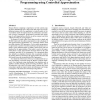Free Online Productivity Tools
i2Speak
i2Symbol
i2OCR
iTex2Img
iWeb2Print
iWeb2Shot
i2Type
iPdf2Split
iPdf2Merge
i2Bopomofo
i2Arabic
i2Style
i2Image
i2PDF
iLatex2Rtf
Sci2ools
125
click to vote
PLDI
2010
ACM
2010
ACM
Green: a framework for supporting energy-conscious programming using controlled approximation
Energy-efficient computing is important in several systems ranging from embedded devices to large scale data centers. Several application domains offer the opportunity to tradeoff quality of service/solution (QoS) for improvements in performance and reduction in energy consumption. Programmers sometimes take advantage of such opportunities, albeit in an ad-hoc manner and often without providing any QoS guarantees. We propose a system called Green that provides a simple and flexible framework that allows programmers to take advantage of such approximation opportunities in a systematic manner while providing statistical QoS guarantees. Green enables programmers to approximate expensive functions and loops and operates in two phases. In the calibration phase, it builds a model of the QoS loss produced by the approximation. This model is used in the operational phase to make approximation decisions based on the QoS constraints specified by the programmer. The operational phase also inc...
| Added | 10 Jul 2010 |
| Updated | 10 Jul 2010 |
| Type | Conference |
| Year | 2010 |
| Where | PLDI |
| Authors | Woongki Baek, Trishul M. Chilimbi |
Comments (0)

